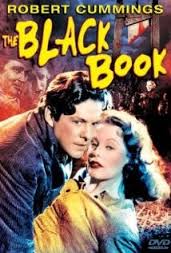
REIGN OF TERROR/THE BLACK BOOK
US, 1949, 89 minutes, black and white.
Robert Cummings, Richard Basehart, Richard Hart, Arlene Dahl, Arnold Moss, Norman Lloyd, Charles Mc Graw, Buelah Bondi, Jess Barker.
Directed by Anthony Mann.
The Reign of Terror, also called The Black Book, had a theme which was popular in small historical thrillers at the end of the 1940s, films about Cagliostro, Black Magic, and the French Revolution.
This is an early film by director Anthony Mann and showed his abilities as director, working on a number of westerns with James Stewart during the 1950s and then moving on to bigger budget films including The Fall of the Roman Empire.
What is particularly striking about the film is the set decoration by celebrated designer, William Cameron Menzies, who won a number of awards, designed such films as Things to Come and also directed some small-budget films.
Robert Cummings is not the actor that one would expect for the central role but carries it off with some aplomb. Arlene Dahl was very popular at this time. But the film belongs to Richard Basehart with his intense performance as Robespierre, showing his mania, his self-delusion, his desire to be dictator for the sake of the people until his downfall.
1. A Hollywood interpretation of the French Revolution and the Reign of Terror?
2. Black-and-white photography, the stylised sets, light and shadow, photography angles, close-ups? An intensity in the production? The musical score?
3. The title, the period in France, Robespierre and his move towards dictatorship, his black book with the names for victims?
4. The focus on Robespierre, his role in the Revolution, the confrontation with Danton at the beginning, the many executions, the confrontation with Barras, his relying on Fouchet and the secret police? His not trusting people? Except Saint Just? His ideas about himself, his talk about the will of the people, his maintaining his fidelity to the beliefs of the Revolution? His killings, the guillotine? Presence in Parliament? His wanting the book, trusting Charles but believing him to be someone else? The intrigues? People rising up against him? His condemnation and his own execution?
5. Charles, in disguise, taking the place of the agent from strasbourg? His past relationship with Madelon? Distrusting her? His movements, infiltrating, the contact with Robespierre, the commission to find the book? His speculation that Robespierre had it and was holding it as a threat? The various adventures, the fights, Fouchet, Barras, being rescued by Madelon? The revival of his love? The discovery of the book?
6. Madelon, working under cover, relationship with Charles, falling out, the resumption of the relationship? Her rescuing him from dangerous situations? Prison? The coach and the ride?
7. The revolutionaries, their stances, against Robespierre? The secret police? Fouchet, his double dealings? Barras as Robespierre’s target?
8. The end, the innkeeper, the identification? St Just and his relationship with Robespierre? Ruthless?
9. Bringing the agent’s wife from Strasbourg, Madelon disguising herself, kissing Charles, the later arrival of the actual wife? The pursuit, the wagon in front
of the coach? The escape?
10. The ending with the downfall of Robespierre? And the romantic ending?
11. The irony of the arrival of Napoleon? Subsequent French history?